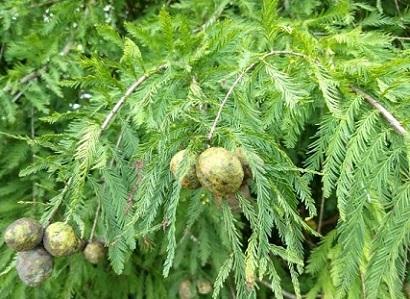Cypress and Cedar extracts show potential as antiviral agents against enveloped viruses
Nikhil Prasad Fact checked by:Thailand Medical News Team Sep 04, 2024 6 months, 4 weeks, 1 day, 7 hours, 4 minutes ago
Herbs And Phytochemicals: In a recent study conducted by researchers from Kitasato University, Japan, and the National Institute of Technology, Oita College-Japan, it was found that cell extracts derived from cypress and cedar trees exhibit potent antiviral properties against enveloped viruses. This
Herbs And Phytochemicals news report will delve into the key findings of the study, which sheds light on the potential se of these extracts as natural antiviral agents.
 Cypress & Cedar extracts show potential as antiviral agents against enveloped viruses
The Study and Its Context
Cypress & Cedar extracts show potential as antiviral agents against enveloped viruses
The Study and Its Context
This study explored the antiviral efficacy of cell extracts (CEs) derived from cypress (Chamaecyparis obtusa) and cedar (Cryptomeria japonica) trees. These trees, which are abundant in Japan, have long been used in construction, with their residual materials often being treated as waste. The researchers aimed to determine whether these leftover materials could serve a more valuable purpose, particularly in the fight against viruses.
Methodology: A Closer Look at the Extracts
The research team used a cold vacuum drying system to extract CEs from the branches and leaves of cypress and cedar trees. This method, which operates at low temperatures, preserves the integrity of heat-sensitive compounds within the plant materials. The chemical composition of the extracts was then analyzed using gas chromatography-mass spectrometry (GC-MS), which identified key components such as terpinen-4-ol, α-terpinyl acetate, and α-pinene.
Key Findings: Strong Antiviral Activity Against Enveloped Viruses
The study revealed that CEs from both cypress and cedar exhibited significant antiviral activity against phi6 bacteriophage, a model for enveloped viruses. The extracts were able to inactivate the virus to undetectable levels within just 30 seconds of exposure.
Notably, this effect was observed at extract concentrations as low as 25%, demonstrating the potency of the CEs even at reduced strengths.
Interestingly, the antiviral effects were more pronounced at higher temperatures (around 30°C), with the effectiveness slightly diminished when the temperature was lowered to 4°C.
The study also tested the antiviral activity of the extracts against MS2 bacteriophage, a model for non-enveloped viruses. However, the CEs did not exhibit any significant antiviral effects against MS2, indicating their specificity for enveloped viruses.
The Role of Chemical Composition
The chemical analysis showed that the primary antiviral components in the cypress extract were terpinen-4-ol, α-terpinyl acetate, and bornyl acetate, while the cedar extract was rich in terpinen-4-ol and α-pinene. These compounds are known for their antimicrobial properties, and their presence in the extracts likely contributes to the observed antiviral activity.
r />
The high content of terpinen-4-ol in both extracts is particularly noteworthy, as this compound has been identified in other studies as having strong antiviral and antimicrobial properties. For instance, terpinen-4-ol is the main component of tea tree oil, which has been shown to be effective against various viruses, including influenza.
Potential Applications and Future Research
The study's findings suggest that CEs derived from cypress and cedar could be developed into natural antiviral products, such as sanitizers and surface sprays, specifically targeting enveloped viruses like influenza and potentially even SARS-CoV-2. The fact that these extracts are derived from biomass materials that would otherwise go to waste adds an environmental benefit to their potential use.
However, the researchers noted that further studies are needed to explore the full range of antiviral activities of these extracts, particularly against different types of enveloped viruses. Additionally, there is a need to standardize the extraction process to ensure consistency in the chemical composition and antiviral efficacy of the extracts.
Conclusion: A Promising Future for Natural Antivirals
In conclusion, the study conducted by the team from Kitasato University and their collaborators has opened up new possibilities for the use of natural extracts as antiviral agents. The potent activity of cypress and cedar extracts against enveloped viruses, combined with their sustainable sourcing, makes them promising candidates for further development. This research could pave the way for new, eco-friendly antiviral products that are both effective and accessible.
The study findings were published in the peer-reviewed journal: Microorganisms.
https://www.mdpi.com/2076-2607/12/9/1813
For the latest on Herbs And Phytochemicals, keep on logging to Thailand Medical News.
Read Also:
https://www.thailandmedical.news/news/french-study-finds-that-a-phytochemical-from-st-john-s-wort-shows-promise-as-a-broad-spectrum-antiviral-against-coronaviruses
https://www.thailandmedical.news/news/proanthocyanidins-and-methyl-gallic-acid-glucoside-from-saxifraga-plants-exhibit-virucidal-properties
https://www.thailandmedical.news/news/herbs-and-phytochemicals-geraniin-from-elaeocarpus-sylvestris-inhibits-herpes-simplex-virus-1
